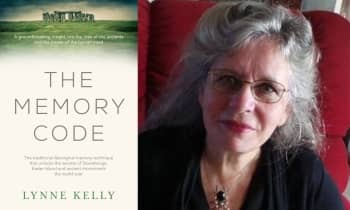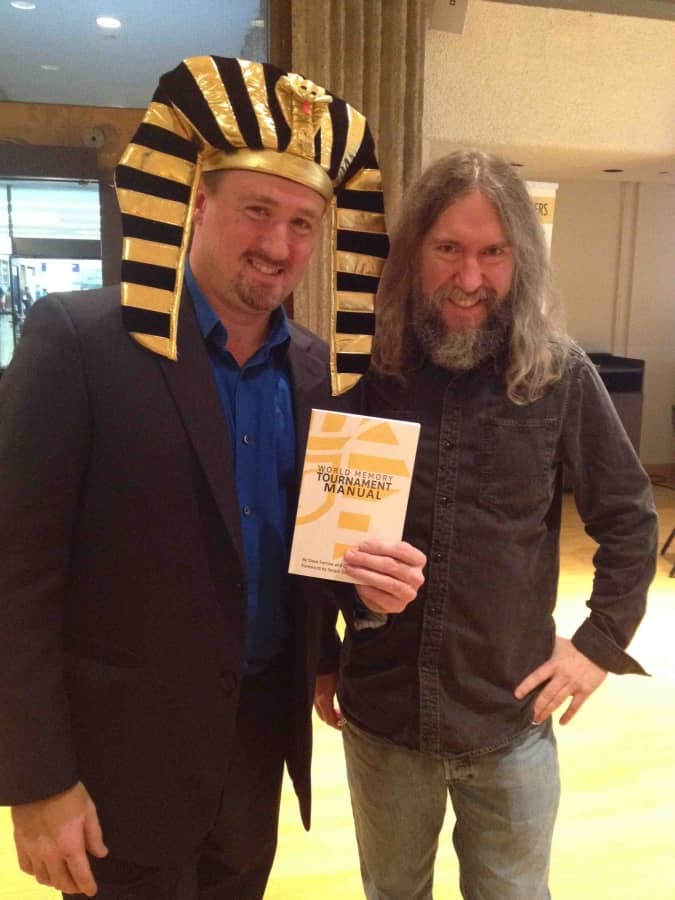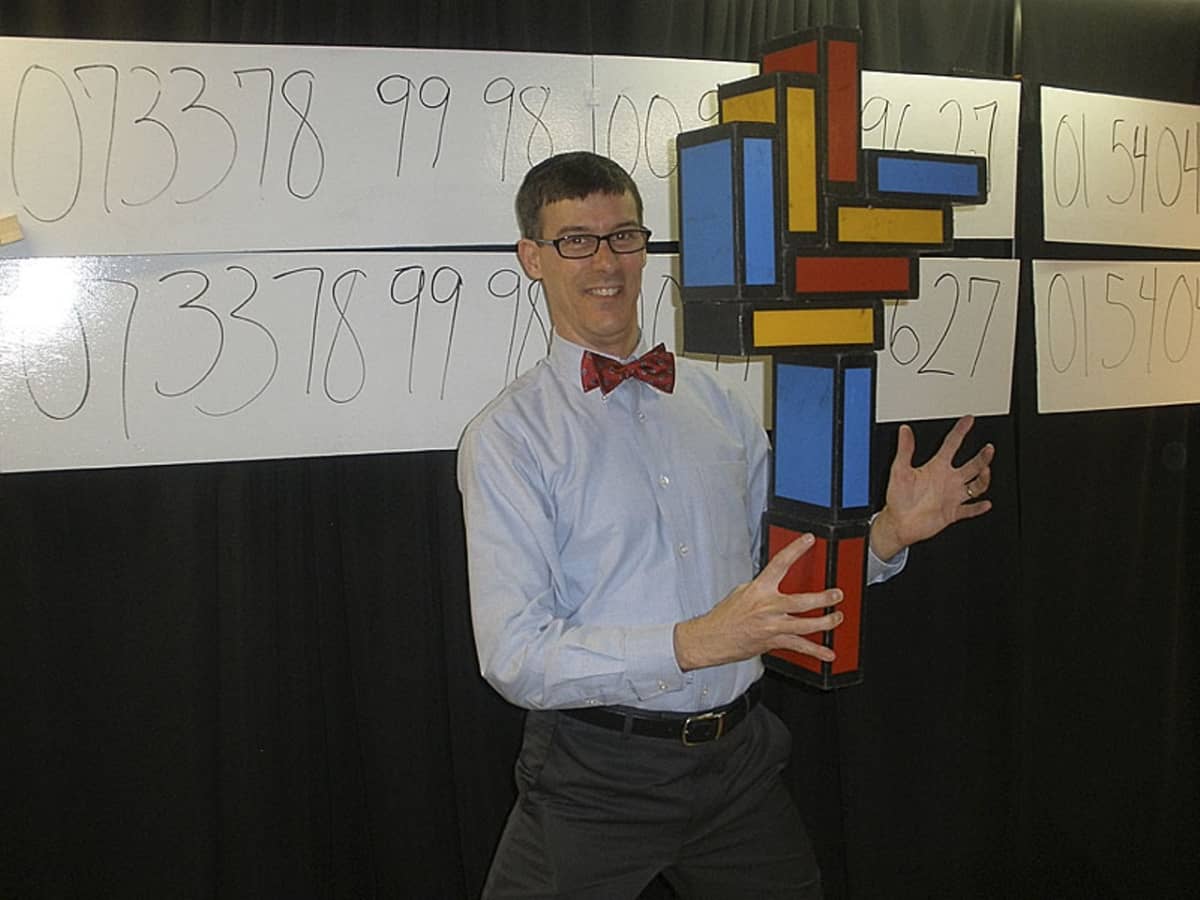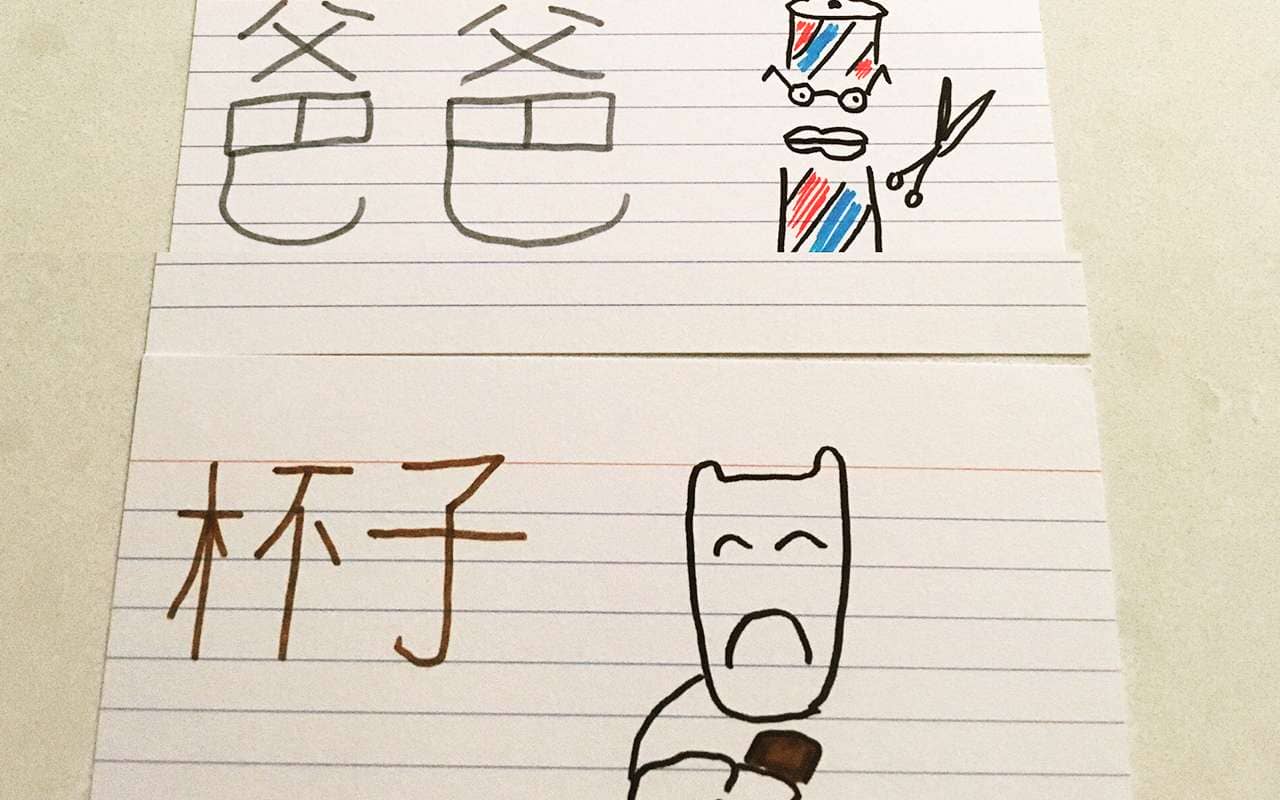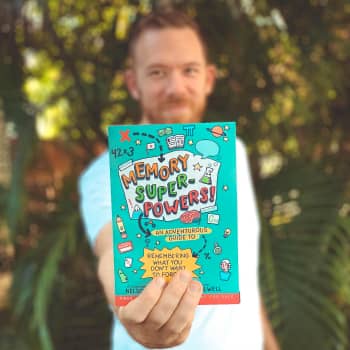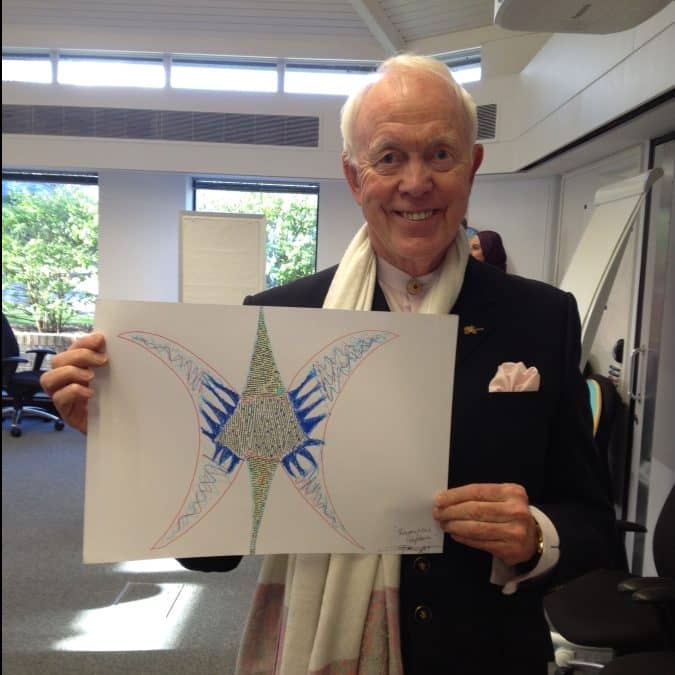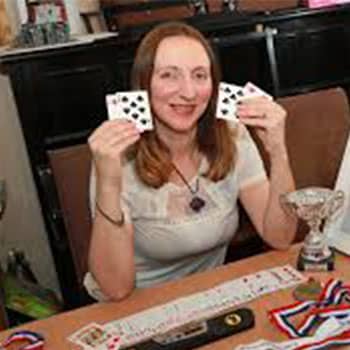Podcast: Download
Subscribe: Apple Podcasts | RSS
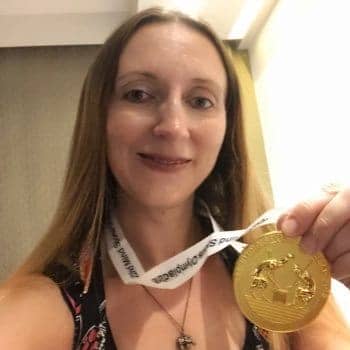 Imagine mastering a new language using the same memory techniques the help memory champions remember thousands of random digits or multiple decks of cards.
Imagine mastering a new language using the same memory techniques the help memory champions remember thousands of random digits or multiple decks of cards.
Although you’d be forgiven if you can’t see the connection, I’ve interviewed many memory athletes over the years.
Not all of them also learn languages. But many do.
And for the first time ever, I’ve gathered the best tips from seven highly successful memory athletes who have also studied at least one other language.
Each of the memory champs you’ll discover on this page know exactly how you can make even the most abstract word or challenging grammar principle stick like glue.
So read on to discover how these memory mavens can help you revolutionize how you approach language learning.
In some cases, their approaches might seem to challenge conventional wisdom.
But as a PhD and professor who has followed their tips myself to pass more than a few language exams around the world, I know the value of how using memory techniques can dramatically slash time spent learning.
Ready for these potent strategies for your journey into fluency?
Let’s dive in!
The Common Memory Technique For
Language Learning That Binds Them All
One quick point before I introduce you to our first memory athlete.
Each and every one of the champions I’ve spoken to over the years uses the Memory Palace technique in one form or another.
There’s good reason for that, but in case you’re not familiar with this ancient mnemonic method, it works like this:
- Choose a familiar location (like your home, school or workplace)
- Create a mental map by imagining a specific journey through the location with special places you’ll use to…
- Mentally link words and phrases you want to learn with mnemonic images at each stop
- Mentally walk back through each location to retrieve the images using a process called spaced repetition
- Practice elaborating and strengthening the associations while reading, writing, speaking and listening to the target language
That’s the basics of the technique each memory athlete will mention in one form or another. For more on using this technique for developing fluency, you can check out this post on the Memory Palace for language learning.
Now let me introduce you to someone who is not only an accomplished memory athlete, but also a highly respected scholar. She’s even a recipient of the Order of Australia!
One: “Have Hooks For Everything”
Lynne Kelly is an Australian author, science educator and memory athlete. Her books The Memory Code and Memory Craft are legendary amongst people who use mnemonic strategies.
In Memory Craft, Kelly advises language learners to prepare their memory systems in advance, particularly the associations they will use.
She gives a number of examples for “hooks” she’s used while learning Chinese, for example. Because Mandarin characters involve so many radicals and other components, you can learn them a lot faster by having a “bestiary.”
That’s a medieval and renaissance era word for what some of us now call pegwords.
Basically, to use this type of memory system, you assign an image to each letter of the alphabet. That way, when you need to memorize a new word, you always have some kind of starting point for placing associations in your Memory Palaces.
For example, if you have to memorize the words “to be,” you just draw from your bestiary of images, such as a toad and a bumble bee.
Kelly prefers animals for these images. But you can use anything that makes sense to you, such as celebrities, friends, teachers and so on. The key is to forge the links alphabetically.
Two: “Study In Focus Bursts”
I was surprised when I told Dave Farrow I was studying Chinese. He immediately spoke to me in Mandarin – like it was nothing!
Farrow holds two Guinness World Records for memorizing multiple decks of cards.
He’s also an author, entrepreneur and inventor with a keen interest in robotics.
As you can see from the picture I took with him below, he also has a sense of humor about his last name sounding like “pharaoh”.
The trick for Dave is that he never spends too much time focused on learning any one thing.
As he told me when it comes to language learning:
Get all of the vocabulary on your phone and do five minute chunks here and there. Do it really intensely for a short time, have a timer on you, and that’s what can get you to that level.
Although you might be skeptical that this technique will work, scientists have studied processes they call interleaving and chunking.
Dave is basically doing a personalized version of these techniques with some Memory Palaces and other mnemonics woven in.
Three: “Crazy Combinations On Cards”
Brad Zupp has done all kinds of things on the memory competition circuit. He’s memorized an entire deck of cards in 90 seconds, 1,050 digits in 30 minutes and set a record at the 23rd annual World Memory Championship.
In that case, he listened to a 150-digit number, which is basically the equivalent of 15 phone numbers. To be clear, he only heard the numbers and never saw them written down.
Yet, using memory techniques, he recalled them all with 100% accuracy.
When it comes to language learning, Zupp told me that he started learning Japanese on a word-by-word basis by first picturing each word in English.
Building on that foundation, he created what he calls “funny little pictures” for each syllable of the Japanese vocabulary. This is basically another version of the chunking advised by Dave Farrow.
The difference is that Zupp also used flashcards as part of the process. As he told me:
I just got a bunch of them and I started filling one of these up a day. In between writing out the Japanese word and the English word, picturing the crazy combination, and then reviewing them and testing myself at the end of the day, I was learning 50 to 100 vocabulary words a day.
People were spellbound – the Japanese people I was working for, and the English-speaking people I was working with. At the end of the first week when I had 400 or 500 vocabulary words, they are going “How are you learning to speak Japanese? How are you doing that?” They were saying “You’re a genius.”
Brad’s a bit too modest for such high praise, however. He responded to the compliments like this:
“No, I’m not a genius, trust me.” I said, “Here, let me let me show you. See, with this word I pictured this, and then I pictured this.”
They were like “Oh, that’s pretty easy.” I would then teach them five words this way and they’d learn them.
In other words, Zupp didn’t leave the job of language learning to memory techniques alone. He got writing into the process by creating his own flashcards and placing crazy images on them. Language learning expert Gabriel Wyner also teaches this strategy in his book Fluent Forever and it’s a good one.
Four: “You’re Not A Tape Recorder”
It’s tempting to think that human memory is like a video camera. But both memory science and memory athletes assure us that our memory is nothing like that.
Nelson Dellis has won the USA Memory Championship five times and is an avid language learner. He’s also summited Mount Everest and written several books, like Remember It and Memory Superpowers!
In addition to tips very similar to what we’ve already discussed, I want to raise two of his best points related to language learning and motivation.
First, Nelson is often challenged when out in public. But he says it’s important not to think that you’re a “tape recorder” just because you use memory techniques.
In other words, you have to be realistic about the role of memory techniques in your language learning journey. They’re a tool, not a magic bullet.
Second, many people get frustrated, confused and lose motivation. As Nelson told me, however, it’s best to treat it just like summiting Everest.
“You know the summit is there. So there’s literally only one thing you have to focus on: where you’re going to put your hand next.”
This is great advice because many people get hung up on how long it takes to learn a language or how many words they need to know in order to be fluent.
Although those considerations are interesting, the answers can deflate your interest and make progress seem glacial slow, if not impossible. But in the time you spend seeking the answers, you can have memorized new vocabulary and moved toward the goal.
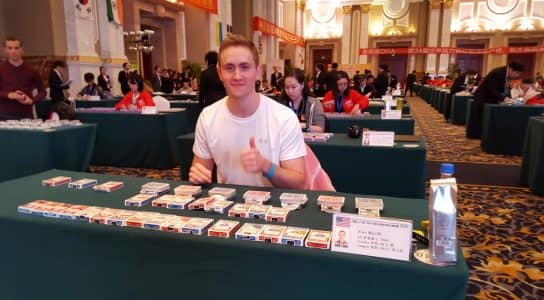
Five: “Use Interaction”
Alex Mullen has won the World Memory Championship three times, amongst many other competitions. He’s also an accomplished medical professional and Mandarin speaker.
As he points out:
Personally, I used mnemonics to learn Spanish and also to learn Chinese. Every language obviously presents with its own unique set of challenges. Chinese is obviously much different than Spanish. I do a couple of different tweaks and nuances to learn the Chinese things. It’s still all pretty much the general idea of [memory] palace images.
The key point that Alex stresses in how he has his associations interact within his Memory Palaces.
Using the term “loci” for the spot inside of a Memory Palace, Alex suggests that you focus on having your associations interact as vigorously as possible.
This is good advice because a lot of people are not energetic enough when first applying mnemonics to language learning. It can be tricky to learn and some people are cautious about having so many wild things going on in their minds.
But back to Nelson Dellis, he told us when he hosted my podcast that people not take these matters too seriously. Most of us will forget our associations anyway, leaving only the foreign language words and phrases we want to be able to recall.
Six: “Fear Is Inescapable”
I’ve talked a lot about memory athletes so far. But what about the man who created memory competitions in the first place?
Tony Buzan loved using memory techniques so much with his friends that he took the concept international in the form of competitions, basically using chess showdowns as a model.
He told me that many people understand and want to use memory techniques but stop them because they’re worried about all the mistakes they might make. But he suggests reversing the problem like this:
What’s worse, living in fear of what could go wrong, or knowing your potential, and not reaching it? Not, “What if this goes incredibly wrong?” but, instead, “What if this goes right and I never find out?”
As he points out, “fear is inescapable,” so why not feel the fear and use memory techniques to help yourself learn languages anyway?
Seven: “Make It Fun”
Katie Kermode holds a world record for memorizing the most names and faces in 15 minutes. She also helped create a web-based software many memory athletes use to train for competitions.
Although I didn’t speak with Katie about language learning in the sense of speaking a language, she’s a programmer and using the Memory Palace technique for coding is definitely an option.
Her advice is to make using the techniques fun, no matter what goal you’re applying to. As she notes:
It’s a creative endeavor, it’s fun. It’s not something like where my parents went to school they had to memorize lists of things, countries and capitals, and they didn’t really do it in a fun way. It was just your rote learning. For some people – some people enjoy that, and that’s fine, but a lot of people find that so tedious that they just put off the idea of memorizing completely.
Unfortunately, a lot of people wind up observing their parents and adopting their attitudes due to how implicit memory works.
Thanks to people like Katie and everyone featured today, fun is clearly becoming more and more an obvious option for learners around the world.
Whether you’re learning a new language like Spanish or a programming language like Python, you now know that there are memory athletes out there who apply their incredible strategies to help them achieve their own learning goals.
If you’re intrigued and would like to learn their strategies yourself, grab my free course here:
It gives you four videos and worksheets that take you through all of the techniques mentioned by the memory athletes above.
And in case you’re wondering if any of my own students in the Magnetic Memory Method Masterclass have won a memory competition and succeeded with language learning, the answer is absolutely yes.
James Gerwing completed my course and started getting 90% and higher in his Latin exams… while spending his last years as a school administrator before retiring.
Then, after he retired, he became the 2019 Canadian Memory Champion!
Even better, he shares how my training helped in this episode of the Magnetic Memory Method Podcast.
The key to understand is that all of us who succeed with these techniques are basically following the same key principles.
And now that you know what they are, what do you say?
Are you ready to get out there and make advances in your language learning journey? Make it happen!
Related Posts
- Stoic Secrets For Using Memory Techniques With Language Learning
Christopher Huff shares his Stoic secrets for using memory techniques when learning a language. You'll…
- The German Professor Who Defends Memory Techniques for Language Learning
This professor defends memorization techniques for learning foreign languages and has the science to prove…
- How to Use a Memory Palace for Language Learning
Using a Memory Palace for language learning is effective if you approach it the right…

